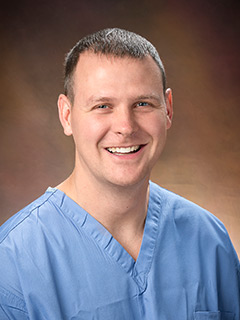HOW CAN WE HELP YOU? Call 1-800-TRY-CHOP
In This Section
RNA Innovation, Reducing Asthma Triggers, Early Autism Interventions

This week in the news, Stefano Rivella, PhD joins the Penn Institute for RNA Innovation, CAPP+ makes strides in reducing home asthma triggers, Jeff Pennington provides big data expertise on HIMSS panel, CHOP researchers identify heart valve structural differences in patients experiencing tricuspid regurgitation, a new study suggests benefits of earlier autism intervention, and CHOP and HTS announce a new center for traffic safety.
Dr. Rivella Named Leader of RNA Gene Therapeutics Group
Stefano Rivella, PhD, the Kwame Ohene-Frempong Endowed Chair in Pediatric Hematology and scientific director of the Comprehensive Center for the Cure of Sickle Cell Disease and Other Red Blood Cell Disorders at CHOP, joined the Institute for RNA Innovation at the University of Pennsylvania as the leader of the RNA Gene Therapeutics group. The group's goal is to promote the development and implementation of RNA therapeutics across institutions. Dr. Rivella brings his expertise on new technologies that have made using RNA to modulate biological pathways to cure disease possible.
Dr. Rivella's research is concentrated on the pathophysiology of erythroid and iron disorders, and in the generation of lentiviral vectors to treat hematological disorders. Disorders such as anemia of inflammation, hemochromatosis, and polycythemia vera – excessive production of red blood cells – also propel the work of the Rivella Laboratory, which has grown to encompass the development of tools for RNA delivery, such as gene editing and RNA therapies, to treat these disorders.
Read more about Dr. Rivella's new role in the Penn Institute for RNA Innovation announcement.
CAPP+ Works With Community Partners to Reduce Asthma Triggers at Home
In Philadelphia, research has indicated that Black and Hispanic children in low-income urban areas experience higher rates of asthma-related morbidity and deaths. CHOP established the Community Asthma Prevention Program (CAPP) in 1997 to help reduce asthma disparities by offering clinic-, home-, and community-based education services to families with children with asthma.
Founder and Director of CAPP, Tyra Bryant-Stephens, MD, joined by colleagues from CHOP and Penn, published a case study that examines the implementation of Community Asthma Prevention Program Plus (CAPP+) to address the disparities in asthma-related housing quality due to economic barriers. Structural defects in a home can result in mold growth and poor ventilation that can exacerbate asthma. CAPP+ facilitates a partnership between CHOP and two nonprofit home repair agencies to remediate the homes of children with asthma by paying for, coordinating, and conducting home repairs specifically targeted to reduce the presence of these in-home asthma triggers.
"Parents described improvements in their child's asthma following home repairs, including fewer symptoms and less hospitalization and emergency room visits," Dr. Bryant-Stephens said in her video abstract. "These findings may be very helpful for those of us as pediatricians who take care of children with asthma."
CAPP+ repaired 97 homes from 2018-2021, with 50 more projected for completion in 2022.
The study was published in Pediatrics.
CHOP Informatics Leader Speaks on HIMSS Panel
Associate vice president and chief informatics officer at CHOP Research Institute Jeff Pennington shared his big data expertise in "Views from the Top: Integrate and Derive Insights From Multi-Modal Health Data," a panel discussion hosted by the Healthcare Information and Management Systems Society (HIMSS) at its 2023 Global Conference & Exhibition. Tehsin Syed, general manager of health artificial intelligence (AI) at Amazon, moderated the discussion, which took listeners through the different ways healthcare has become digitized to improve and personalize patient care, analyze population health trends more efficiently, and share data securely across institutions.
Pennington spoke about the ways healthcare seeks to leverage growing digitization and research, such as how combining brain imaging with genomics and smartwatch activity can create a more complete "picture" of the lives and overall health of patients. Research discoveries based on this picture have the potential to lead to more targeted diagnostics and treatments.
Pennington leads research data strategy through Arcus, a program that links CHOP's clinical and research data on one platform. The library enables researchers to perform next-generation computational biology, machine learning, and translational research using large datasets.
"Arcus puts us at the 'starting line' for making significant breakthroughs from the massive amount of data that CHOP has," Pennington said. "For example, I'm very excited to see our nurse scientists use machine learning to better support families at risk of postpartum complications for babies born in our Special Delivery Unit."
Nurse Scientist Elizabeth Froh, PhD, and her team worked with Arcus to analyze free-text narrative patient data in the electronic health record to create a model to support clinical decision making.
Cardiac Center Researchers Identify Tricuspid Valve Differences in HLHS Patients
Matthew Jolley, MD, an attending physician in the Center for Pediatric Valve Disorders, and colleagues in the Cardiac Center at CHOP determined patients with hypoplastic left heart syndrome (HLHS) experiencing moderate to severe tricuspid regurgitation (TR) have structural differences in their tricuspid valve (TV) that vary from patient to patient. The researchers used 3D echocardiogram and an image processing platform called SlicerHeart to investigate whether the structure of the TV varies in association with the severity of TR.
"We have released the novel valve modeling software we used to perform this research, which was led by Hannah Nam here in the Jolley Lab, to facilitate transparent and reproducible valve science, in order to help more patients with this condition," Dr. Jolley said.
Children with HLHS typically undergo open-heart surgery to redirect the circulation of blood-flow to the right side of the heart, but the new connection makes TR, when blood leaks back into the right atrium, life-threatening for these patients. Researchers studied the tricuspid valve structures of 100 patients with HLHS and Fontan circulation and found statistically significant associations between TV structure and function, suggesting the best surgical results would come from understanding the high-quality imaging of the patient's specific heart anatomy.
Learn more about Dr. Jolley's work in this CHOP press release. The study was published in Circulation: Cardiovascular Imaging.
Research Indicates Benefits of Earlier, Individualized Autism Interventions
Although prior correlative studies suggest that early intervention for autistic children leads to greater developmental benefits, a new randomized controlled trial co-authored by Whitney Guthrie, MD, from the Center for Autism Research and colleagues from Florida State University and University of California, Los Angeles also indicated that beginning interventions at 18 months of age could be beneficial to a child's progress.
The study used the Early Social Interaction (ESI) model, a parent-implemented intervention that provides support for social communication and active engagement for toddlers with autism spectrum disorder. Study results showed that children who received individualized ESI at 18 months compared to 27 months of age demonstrated greater gains in the use and understanding of language, social use of communication skills, and self-help skills than the children who received it later. Key to the findings is the individualized parent-coaching aspect of the model compared to group-based treatment.
"Our findings underscore the importance of a swift referral for evaluation if a child screens positive for autism, or if there is any professional or caregiver concern for autism," Dr. Guthrie said. "We want to make sure that toddlers don't miss this important window for earlier intervention."
Participants included 82 toddlers and their parents who were randomized into groups that received nine months of more intensive individual ESI intervention and nine months of group ESI, with the individual intervention beginning at either 18 months or 27 months of age.
Their study is published in Autism. Learn more on CHOP News.
CHOP and HTS Put Innovative Spin on Traffic Safety
A $1.2 million grant from the New Jersey Division of Highway Traffic Safety (HTS) for the Center for Injury Prevention Research (CIRP) at CHOP will support a new innovative center that will feature an interactive platform equipped to visualize, monitor, and track progress of traffic safety in various New Jersey communities.
The foundational data for the dashboard will come from the New Jersey Safety and Health Outcomes (NJ-SHO) Data Warehouse, which houses a collection of more than 80 million records on 22 million New Jersey residents over a span of 15 years. The NJ-SHO Center for Integrated Data aims to enhance this resource by providing more than just crash data, delving into demographic and community characteristics of drivers, passengers, and pedestrians to promote transportation equity for all. The information will be publicly accessible to stakeholders online.
CIRP researchers will be responsible for updating the data warehouse and liaising with stakeholders to ensure the interactive dashboard continues to meet community needs.
"We commend our partners in New Jersey for expanding access to a wide array of data, which will encourage local and state-wide solutions for reducing the burden of injuries and deaths related to crashes," said Allison Curry, PhD, director and principal investigator of the NJ-SHO Center for Integrated Data and a senior scientist at CIRP at CHOP. "We look forward to the next chapter of our decade-long partnership with HTS to improve health and safety by linking data in innovative ways."
Read more in this CHOP press release.
ICYMI
Catch up on our headlines from our April 14 In the News:
- Arcus Enables Researchers to Use Novel Technique for Clinical Data
- First-in-Child Trial Supports Safety, Efficacy of Lorlatinib for High-risk Neuroblastoma
- D3b Supports to Rare Tumor Sample Milestone in CORSICA Project
Keep up with our news, stories, and updates in real time by following us on Twitter, LinkedIn, or Instagram. Meet the minds behind the science in the Bench to Bedside podcast. Or subscribe to our newsletter to get an email sent every other Friday by signing up here.








